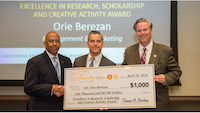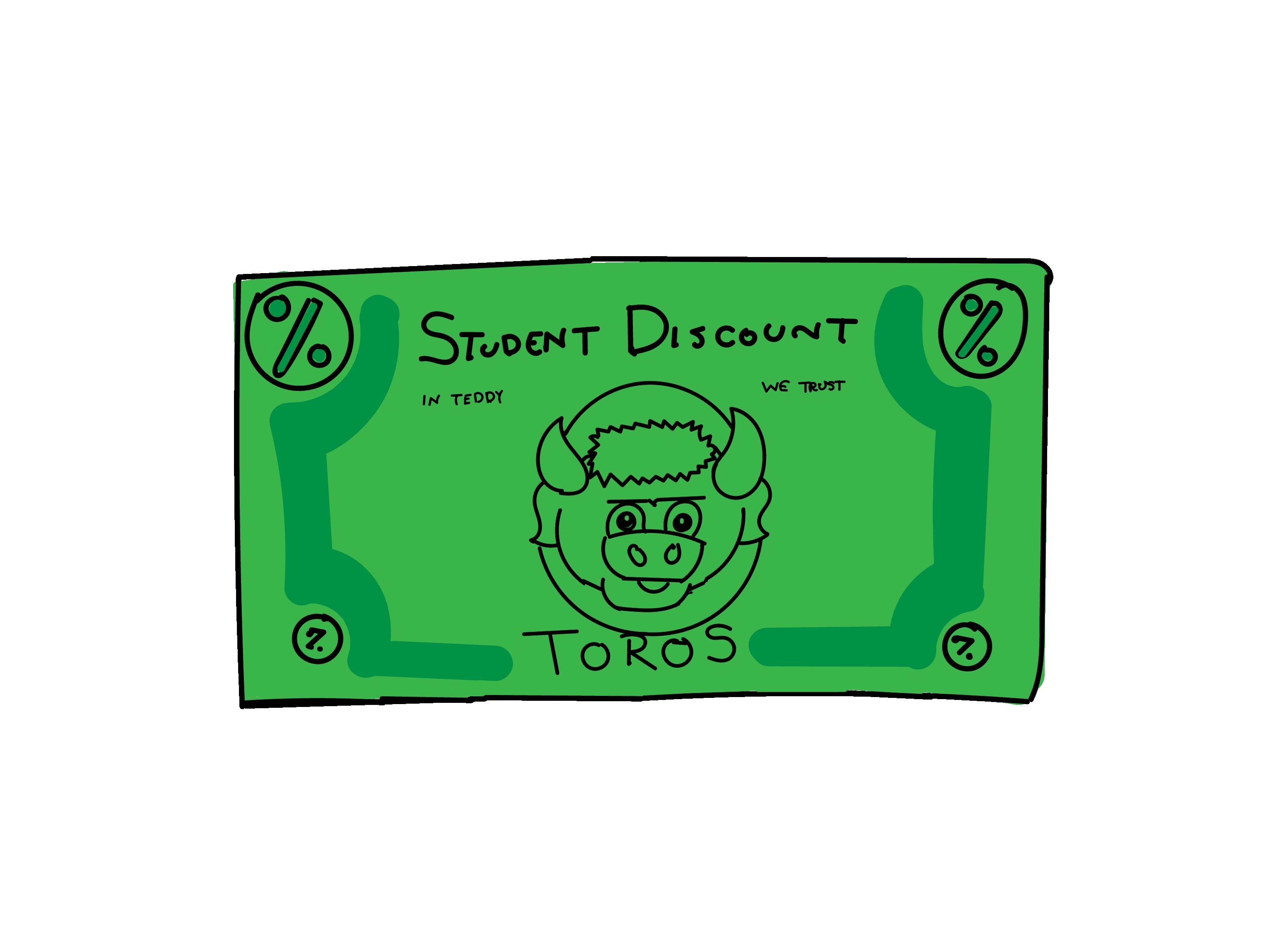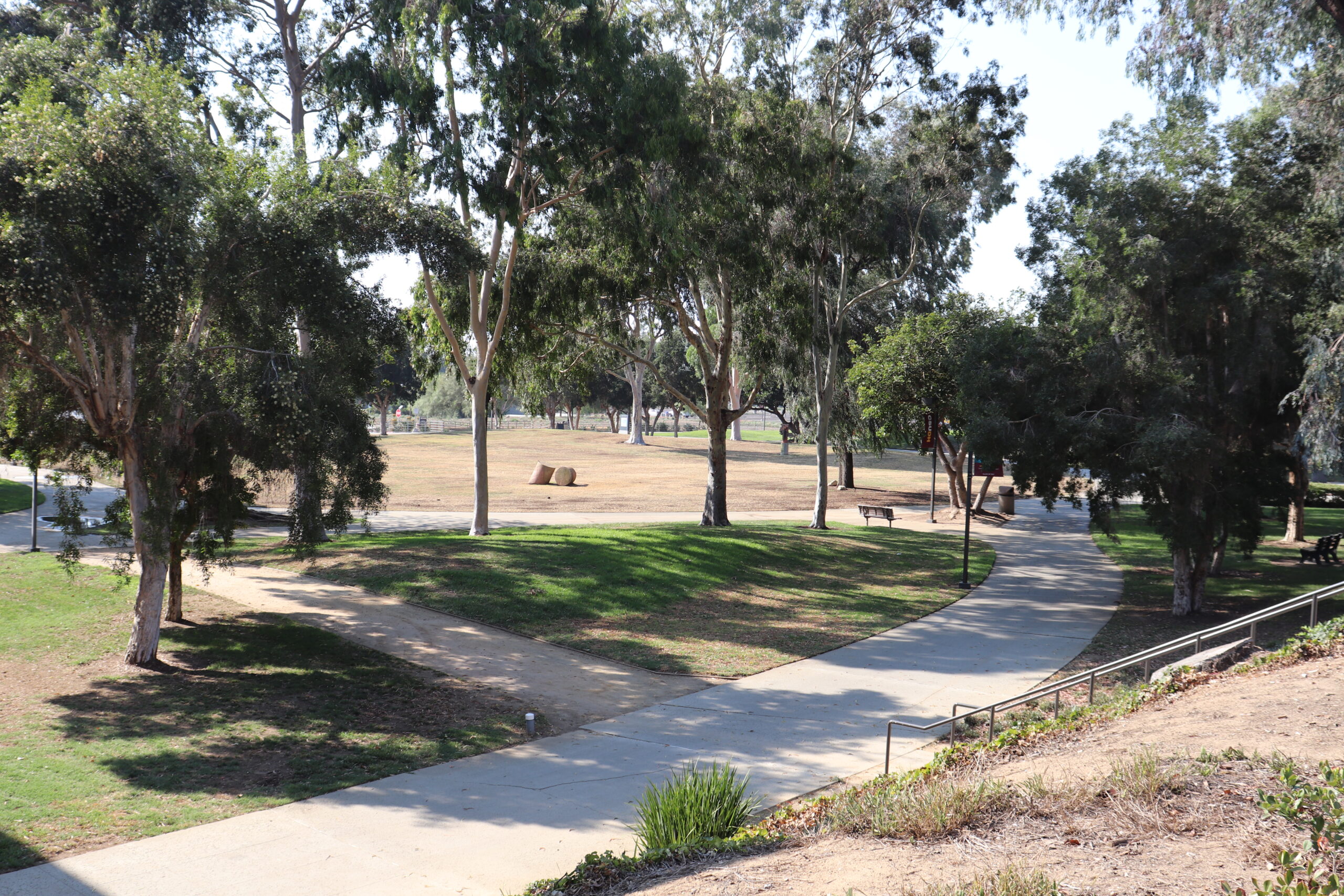In the last in-person CSUDH Faculty Awards ceremony (2019), President Thomas A. Parham (left) and Provost Michael Spagna, (right)..stand with a check made out from Shell to Orie Berezan (center), a management and marketing professor and honoree of the 2019 Excellence in Research, Scholarship and Creative Activity Award.
By Brenda Fernanda Verano, News Editor
Although a big focus of his academic career has involved studying ants, it was the virtual elephant in the virtual room at last month’s Faculty Awards ceremony that compelled Terry McGlynn to express his misgivings about Shell Oil sponsoring the event.
During the April 20 virtual ceremony, McGlynn, who was honored as Presidential Outstanding Professor, shared some choice words about the university’s relationship with Shell, and also said he would be donating the $1,000 that came with winning the award to Sunrise Movement LA, a youth organization that focuses on climate change activism.
McGlynn, a biology professor at CSUDH since 2007, said he was honored and humbled at receiving the award, but as a faculty member who supports students at a time when “students are leading the movement to shut down fossil fuels, and to help keep all of us accountable for our actions,” he could not accept the money.
Earlier this year, CSUDH received $1.18 million in performance payments for its achievement in reducing greenhouse gas emissions. McGlynn said that accepting money from a company like Shell that has produced approximately 2.3 percent of those emissions since 1965 is a conversation that needs to be raised.
“As an ecologist, of course I am concerned about carbon pollution and I think it’s an ethical lapse of our university to accept funding from Shell and allow them to use our identity to help greenwash their misdeeds,” McGlynn told the Bulletin earlier this month. “I’m being trained on how to be a leading force to sustainability, at the same time how can I, in good conscience, take money for Shell for teaching the next generation, that’s just not right.”
Despite several emails and phone calls to Shell representatives in media relations and their Los Angeles Refinery, the Bulletin has not received a comment from the company.The Bulletin also reached out to Arleen Chikami, the director of CSUDH Corporate and Foundation Relations, but at press time, had not heard back.
Shell, founded in 1912, is an oil and gas company with approximately 25,000 gas stations across the U.S. Shell’s Southern California Distribution Complex, which is a ten-minute drive in proximity to campus. It is the largest ethanol hub in the West Coast and currently provides storage capacity of over 4.5 million barrels of Shell product.
According to a CSUDH News article from 2011, Shell had sponsored the year’s Faculty Awards, but its ties to the university go back further. “Shell has been a long time donor and supporter of the university, and in recent years has partnered in other ways, as well, including participation on the CSU Dominguez Hills Foundation board of directors, and hiring faculty and students for projects,” read the article. In the past, Shell has been classified as a “President” level sponsor, which according to the 2018 Sponsorship form, would grant CSUDH $25,000.
Along with this year’s faculty awards, which happened to fall on the same day as the university’s Earth Day celebration, Shell also sponsors the campus urban farm and Student Research Day (SRD), which McGlynn has chaired the last two years. He said the last time SRD was held in person, in 2019, he felt “ethically compromised” by Shell’s affiliation, which was displayed on signage, and said he wasn’t the only one.
“You (could) tell by talking to students and faculty they were uncomfortable about it, asking what is the deal with all the Shell,” he said.
According to the CSUDH urban farm page, a 2020 Shell donation currently supports paid internships at the farm, outreach to K-12 classes, and helps in a farm docent training program being developed by the Osher Lifelong Learning Institute. That program offers educational, cultural, and social opportunities for retired and semi-retired individuals ages 50 and up.
Ellie Perry, the CSUDH sustainability manager, said the farms policy is that if “the donation furthers our educational mission and the good we can do without asking us to compromise our values, we’re not going to turn down an opportunity to employ our students or support growing initiatives that help our local community and students going hungry.”
According to a report last year from the Climate Accountability Institute, Royal Dutch Shell, the Netherlands-based parent company of the U.S. based subsidiary Shell Oil Company, is seventh on the list of 20 companies that have contributed an estimated 34 percent of global fossil fuel and concrete emissions since 1965. The company ranks fourth on the list of those companies with American ties.
On its website, www.shell.us, the company has an entire page devoted to what it claims is its sustainability efforts and its stewardship of the environment, including $19.8 million invested between 2015-2017 “in several key conservation efforts across the U.S.”
On one level, the university’s relationship with Shell could be considered a community partnership. Shell’s Distribution Complex is located less than 4 miles from CSUDH. But McGlynn, for one, does that feel that closeness is an asset.
“To me the irony is that Shell, their refineries, are polluting locally [and] harming the health of our communities, giving us a little bit of money to help run our urban farm, meanwhile they can run around and say ‘look! we are helping local communities,’ [when] in reality they are profiting off of polluting that same exact community.”
According to McGlynn, he has privately talked and brought up the issues he and other faculty have with CSUDH receiving money from Shell to campus officials, but had not spoken publicly.
“I was trying to give the university time to do the right thing,” McGlynn said.
He told campus officials it wasn’t just an ethical problem but also an unwise business decision. “I told them I thought it was unethical for the university to affiliate itself with a carbon polluter, and I also said that I thought it was strategically unwise for the institution, considering many universities around the country are moving to divest from fossils fuels, to publicly affiliate ourselves with a fossil pollution. It’s just a bad market for the university as well,“ he said.
Someone who shares McGlynn’s urgency in creating structural change within the university is Katy Pinto, a sociology professor, who was a recipient of the “Faculty Innovation and Leadership Award” in 2019, and who attended the awards last month.
“We should have these difficult conversations as a community and hold ourselves to higher standards. … As a Carson community member and someone worried about climate change, I really appreciated that Dr. McGlynn used his platform to question our relationship with Shell.”
dr. katy pinto, csudh sociology professor
“It’s up to the administration to show leadership and for other groups to support CSUDH, so that we can fund programs like the Presidential Awards without compromising our mission to support our surrounding community,” she told the Bulletin.
Pinto thought that what McGlynn did, donating his award money and bringing awareness to this issue at the ceremony, “is something that needed to be done.”
“We should have these difficult conversations as a community and hold ourselves to higher standards. Dr. McGlynn’s action was asking us to do just that … As a Carson community member and someone worried about climate change, I really appreciated that Dr. McGlynn used his platform to question our relationship with Shell,” she said.
Despite several emails and phone calls to Shell representatives in media relations and their Los Angeles Refinery, the Bulletin had not received a comment from the company.
The Bulletin also reached out to Arleen Chikami, the director of Corporate and Foundation Relations but at press time, had not heard back.
McGlynn chose the Sunrise Movement to donate his award money because of their strong focus on policy change locally, statewide, nationally and internationally to enable climate justice. “Giving money to the Sunrise movement is like investing in the future and supporting young leaders,” McGlynn said.
He made this decision after consulting friends via Facebook. “I was trying to get feedback on what would be the best way to spend the money that would be the most effective in working against the disinformation campaign that Shell has been pushing, and what would be working to help reduce carbon emission systemically,” he said. A donation that the Sunrise Movement acknowledged and accepted. “Thank you, comrade. Your funds will be invested in art supplies, digital tools, and funding mutual aid in our communities,” the Sunrise Movement tweeted on April 13.
McGlynn acknowledges that speaking up about issues like these is a privilege that many do not. He wants those who come across these entities that conflict with one’s values and morals that “sometimes there is a price to pay when you speak truth to power, so you have to decide if you have the privilege to speak up. If you work together as a part of a moment that reduces the risk to any individual.”



